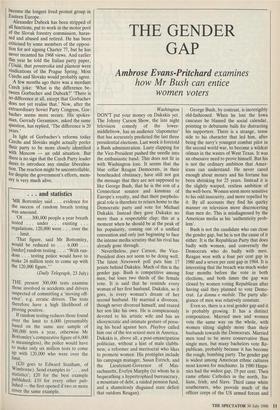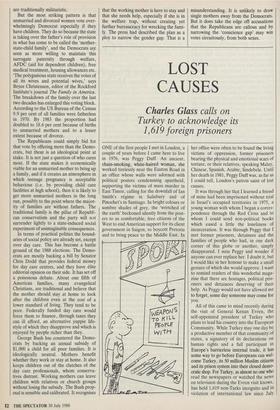THE GENDER GAP
Ambrose Evans-Pritchard examines
how Mr Bush can entice women voters
Washington DON'T put your money on Dukakis yet. The Johnny Carson Show, the late night television comedy of the lower- middlebrow, has an audience 'clapometer' that has accurately predicted the last three presidential elections. Last week it foretold a Bush administration. Lusty clapping for the Vice-President pushed the needle into the enthusiastic band. This does not fit in with Washington lore. It seems that the blue collar Reagan Democrats, in their boneheaded obstinacy, have still not got the message that they are not supposed to like George Bush, that he is the son of a Connecticut senator and kinsman of Europe's royalty, and that their psepholo- gical role is therefore to return home to the Democratic party and vote for Michael Dukakis. Instead they gave Dukakis no more than a respectable clap; this at a moment when he should be at the peak of his popularity, coming out of a unified convention and only just beginning to face the intense media scrutiny that his rival has already gone through. Nevertheless, pace Carson, the Vice- President does not seem to be doing well. The latest Newsweek poll puts him 17 points behind Dukakis. Much of this is the gender gap. Bush is competitive among men, but loses two thirds of the female vote. It is said that he reminds every woman of her first husband. Dukakis, so it goes, is every woman's dream of her second husband. He married a divorcee, though never divorced himself, and reared her son like his own. He is conspicuously devoted to his artistic wife and has an idiosyncratic and intimate gesture of press- ing his head against hers. Playboy called him one of the ten sexiest men in America. Dukakis is, above all, a post-emancipation politician, without a hint of male clubbi- ness; a reformer and meritocrat who likes to promote women. His protegees include his campaign manager, Susan Estrich, and the Lieutenant-Governor of Mas- sachusetts, Evelyn Murphy (to whom he is bequeathing a hypertrophied bureaucracy, a mountain of debt, a raided pension fund, and a shamelessly disguised state deficit that outdoes Reagan). George Bush, by contrast, is incorrigibly old-fashioned. When he lost the Iowa caucuses he blamed the social calendar, pointing to debutante balls for distracting his supporters. There is a strange, tense side to his character that led him, after being the navy's youngest combat pilot in the second world war, to become a wildcat oilman in the wastes of West Texas. It was an obsessive need to prove himself. But his is not the ordinary ambition that Amer- icans can understand. He never cared enough about money and his fortune has been shrinking for 25 years. Instead it is the slightly warped, restless ambition of the well-born. Women seem more sensitive to his odd insecurity, and more repelled by it. By all accounts they find his quirky manner on television more disconcerting than men do. This is misdiagnosed by the American media as his 'authenticity prob- lem'.
Bush is not the candidate who can close the gender gap, but he is not the cause of it either. It is the Republican Party that does badly with women, and conversely the Democrats who do badly with men. Reagan won with a four per cent gap in 1980 and a seven per cent gap in 1984. It is interesting that the breach was much wider four months before the vote in both elections, and both times the gap was closed by women voting Republican after having said they planned to vote Demo- crat. La donna e mobile. The party alle- giance of men was relatively constant.
Even so, there is a real gender gap and it is probably growing. It has a distinct composition. Married men and women vote the same way on the whole, with women tilting slightly more than their husbands towards the Democrats. Married men tend to be more conservative than single men, but many bachelors vote Re- publican, probably because it has become the rough, bombing party. The gender gap is widest among American ethnic cultures most known for machismo. In 1980 Hispa- nics had the widest gap, 19 per cent. Then came ethnic Catholics in the north, Ita- lians, Irish, and Slays. Third came white southerners, who provide much of the officer corps of the US armed forces and are traditionally militaristic.
But the most striking pattern is that unmarried and divorced women vote over- whelmingly Democrat especially if they have children. They do so because the state is taking over the father's role of provision in what has come to be called the 'mother- state-child family', and the Democrats are seen as more willing to maintain this surrogate paternity through welfare, AFDC (aid for dependent children), free medical treatment, housing allowances etc. `The polygamous state receives the votes of all its wives and potential wives,' says Bryce Christensen, editor of the Rockford Institute's journal The Family in America. The breakdown of the family over the last two decades has enlarged this voting block. According to the US Bureau of the Census 9.9 per cent of all families were fatherless in 1970. By 1983 the proportion had doubled to 18.6 per cent because of births to unmarried mothers and to a lesser extent because of divorce.
The Republicans could simply bid for that vote by offering more than the Demo- crats, but there is an ideological point at stake. It is not just a question of who cares most. If the state makes it economically viable for an unmarried mother to bring up a family, and if it creates an atmosphere in which teenage pregnancy is acceptable behaviour (i.e. by providing child care facilities at high school), then it is likely to get more unmarried mothers in the long run, possibly to the point where the major- ity of families are without fathers. The traditional family is the pillar of Republi- can conservatism and the party will not surrender lightly to a state-induced social experiment of unimaginable consequences.
In terms of practical politics the bound- aries of social policy are already set, except over day care. This has become a battle ground of the 1988 elections. The Demo- crats are mostly backing a bill by Senator Chris Dodd that provides federal money for day care centres, and they have elite editorial opinion on their side. It has set off a poisonous debate. About one fifth of American families, many evangelical Christians, are traditional and believe that the mother should stay at home to look after the children even at the cost of a lower standard of living. They tend to be poor. Federally funded day care would force them to finance, through taxes they can ill afford, an alternative yuppie life- style of which they disapprove and which is enjoyed by people richer than they.
George Bush has countered the Demo- crats by backing an annual subsidy of $1,000 a child for all poor families. It is ideologically neutral. Mothers benefit whether they work or stay at home. It also keeps children out of the clutches of the day care professionals, whom conserva- tives distrust. Working mothers can leave children with relatives or church groups without losing the subsidy. The Bush prop- osal is sensible and calibrated. It recognises that the working mother is here to stay and that she needs help, especially if she is in the welfare trap, without creating yet further bureaucracy for wrecking the fami- ly. The press had described the plan as a ploy to narrow the gender gap. That is a misunderstanding. It is unlikely to draw single mothers away from the Democrats. But it does take the edge off accusations that the Republicans are callous and by narrowing the 'conscience gap' may win votes circuitously, from both sexes.















































 Previous page
Previous page